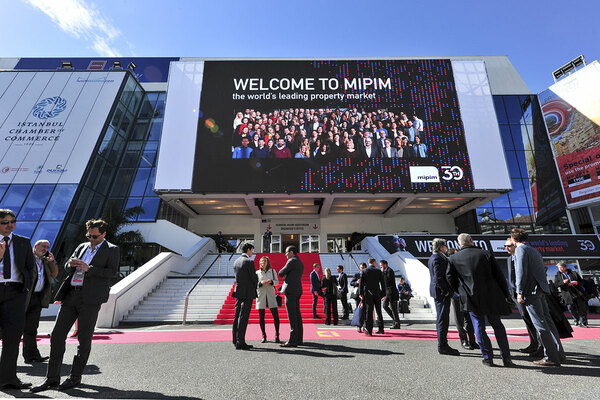You are viewing 1 of your 1 free articles
Dispatches from Cannes: day three
The annual property conference MIPIM is drawing to an end in Cannes. Here’s the latest round-up from Martin Hilditch and Luke Barratt
Sun and sand gave way to wind and rain on the final day of MIPIM.
Locals earned a solid trade hawking parapluies outside the conference and Manchester’s new venue started to look a lot more suitable with its totally covered access route from the main conference area.
With the conference drawing to a close, we were reflecting on what we’d learned: which social landlords want to expand their relationships with private investors, what impact economic and political headwinds are having on the sector, and which financial directors can speak French.
We’ve also learned where Homes England chief executive Nick Walkley was born (Manchester), when he called Inside Housing out in front of a live audience for calling him a "Liverpudlian" in a recent interview.
We couldn’t help noticing, however, that a few minutes later Mr Walkley referred to fellow panellist George Clarke as “a Geordie”, when Mr Clarke is in fact from Sunderland.
The two men clashed over Mr Walkley’s use of the phrase “get sh*t done”, with the architect and broadcaster saying it made it sound like he’d be “building sh*t”.
The government official also took issue with Mr Clarke’s claim that we should be “building less [homes] better”.
In all, the rain did little to dampen spirits at the conference, though it may have discouraged some from venturing outside the central building.
Of those from the social sector who told Inside Housing they were making their first MIPIM appearance this year, all declared their intention to return in 2019.
Takeaways from MIPIM: day three
Nick Walkley, chief executive of Homes England (second from left), on a panel at MIPIM today
1. Nine Elms, 9%, all fine?
Homes England chair Sir Ed Lister is not on the same page as Sadiq Khan, it seems, when it comes to affordable housing at the Battersea Power Station development.
At a session with the site’s developers, Sir Ed defended the minimum target of 9% affordable housing, saying that the decision to keep Battersea Power Station, made “for lots of very good reasons”, meant the affordable levels had to be low.
2. Despite some recent setbacks interest is still high in offsite housing.
Numerous councils are exploring ways to make offsite housing work in their areas.
Ideas floated in conversations with Inside Housing included the possibility of a new garden village with a housing factory either on site or close by, through to ways in which city regions could unlock the potential of modular. Conversations centred on how to make homes that could adapt to the developing needs of their occupants, be that technological or the needs of an ageing population.
Inside Housing also questioned panellists on how new designs would factor in fire safety.
3. The skills crisis is on everyone’s minds
Skills have been brought up constantly at MIPIM this year, but this was especially the case today as sector figures discussed the future of housebuilding.
Nick Walkley suggested that sector figures should sponsor “a chain of academies” to train up the construction workers of the future, suggesting that the education system offered an opportunity to “seize the means of production”.
4. Resident consent is important
Mr Walkley was really getting around today, and if he didn’t get on so well with his previous panel, he couldn’t have clicked better with Ronald Huikeshoven, chief executive of Dutch builder AM.
The two men agreed that providing social infrastructure was crucial to securing residents’ consent on schemes, and Mr Walkley added that social landlords shouldn’t use specialist communications companies to talk to residents, but should do it themselves.
5. Universities are getting in on the act
How do we build homes for the communities of the future – or help existing homes become more energy efficient? Inside Housing spoke to several council chief executives who are looking to work with, or are already working with, universities in their patches to better understand the way people are living in their homes or to look at trialling new tech.
University of Nottingham has been leading a community energy demonstration and research project that has seen the largest community battery in Europe installed in a development near the River Trent.
The battery can store 2.1 MWh of energy, delivering 500kW of power – or as the university put it, enough to power 167 electric kettles simultaneously for more than four hours.
The council and university think this is a solution that could be used more widely in the UK. Other councils were talking about a range of different partnerships and projects. After years of complaining that the construction industry keeps doing the same things in the same way it may be that things are about to to change.
Takeaways from MIPIM: day two
1. Private investors are more and more interested in the sector
A session on affordable housing was standing room only in one of the conference's main rooms.
With James Murray, deputy London mayor for housing, and Metropolitan chief executive Geeta Nanda on the panel, it was clearly aimed at affordable newbies.
One housing association finance director told Inside Housing that the entrance of Blackstone into the sector had sparked interest amongst investors, many of whom are using MIPIM as an opportunity to learn about housing associations.
2. Be careful what you assume about developers!
Despite what conventional wisdom might suggest, the chair and founder of one of London's largest housebuilders is a fan of regeneration ballots.
Tony Pidgley spoke to Inside Housing alongside Sir Bob Kerslake, the Peabody chair. Both came out strongly in favour of resident ballots for estate regeneration, as well as criticising the government over its approach to retaining skilled workers in the Brexit negotiations.
3. Partnership is the word on everyone's lips..
..but not just the public private partnerships that you might think.
In fact, growing partnerships between councils are very much under discussion.
As regional authorities begin to grow and flex their muscles, many councils are exploring the possibilities that greater collaboration might unlock.
As the government revealed the long-term deal it had struck with West Midlands combined authority to deliver 215,000 homes over 12 years one chief executive from another area shared their goal of landing a similar deal in the future with Inside Housing.
Councils in London presented a united front from the London pavilion, directly opposite councils from further north in the Midlands pavilion - at least until Mr Rodwell broke ranks and told an audience of potential investors that Barking and Dagenham is "the best borough in London... Because we're going to build 60,000 homes."
4. "Social landlords need to make the case for socially rented housing more strongly."
Okay - so social rent wasn't one of the main topics of conversation with investors.
But it was the number one topic that for one senior figure close to government who approached Inside Housing at the conference.
They said that social landlords needed to speak up more strongly than they have in the recent past for social rent
This is partly because there is a new housing minister (but when wasn't that the case?) but also because of the realistic prospect of gaining some investment if the case is well argued.
Two deputy London mayors, James Murray and Jules Pipe, also made a point of telling conference attendees at two separate sessions that Sadiq Khan is extremely focused on providing large quantities of social housing.
Mr Murray and Mr Pipe issued what could be seen as a light warning to developers and investors that while London is open for business, it wants that business to include social housing.
5. Disruption and diversity are high on Homes England's agenda.
If a session entitled "how can Homes England disrupt the housing market" didn't make it clear enough, the agency which invests in and funds new homes sees itself as challenging the status quo.
The session, chaired by the agency's chief executive Nick Walkley, with director of infrastructure and PRS Sophie White on the panel, saw panellists talk about a number of ways Homes England could disrupt markets, including by investing in modular homes.
But Mr Walkley says he is also interested in how it might be possible to create opportunity for individuals by increasing the diversity of the housing and construction sector's workforce. The agency had made a start with an all female panel, which Joanne Roney, chief executive of Manchester Council, said was great to be part of because normally "it's just me".
Takeaways from MIPIM: day one
- The London Pavilion is packed...
...but slightly fewer councils from the capital have a stand this year – although others have sent representatives. If the rumour mill is to be believed, the fact that we’re in an election year has encouraged some to put off the opportunity for photocalls at the seaside until 2019.
Indeed, Inside Housing spotted the first open wine bottle of the day as early as 9.15am. It’s not difficult to see why some local authorities felt their residents might not fully understand.
- Office to resi is less of a talking point than last year
This is thanks to a number of councils having introduced Article 4 orders to prevent further offices being converted into homes.
However, there is concern that office-to-resi conversions that have already taken place are having an impact on local markets, with some schemes that had been earmarked for redevelopment to higher-quality housing having been put on hold because the conversions have proved so easy to let – and thus profitable – to localities starved of affordable options.
- This is a council party
Many of the bigger housing associations are in attendance, but it is local authorities who continue to dominate, with everyone from Cornwall to Belfast and Glasgow represented.
Housing associations in attendance include Clarion, Catalyst, Hyde, Genesis, Network, Radian, Swan and Your Housing. Peabody was also in attendance, looking for investment in one of the biggest regen schemes in Europe – Thamesmead.
- The freshly launched Homes England has turned out in numbers to show the market it means business
Chief executive Nick Walkley, who has already said he wants to deliver with “volume” and “pace”, is here, along with much of his senior team.
Those also in attendance include chair Edward Lister, deputy chief exec Tom Walker, head of strategy Louise Wyman, chief investment officer Gordon More, executive director for land Stephen Kinsella, and Sophie White, head of infrastructure, private rented sector and complex projects, who last week told Inside Housing about future plans for the agency's £3bn Home Building Fund.
- Diversity is on people's minds
MIPIM has always been infamous as an overwhelmingly male environment, and some of the more unsavoury stories about the conference’s history are not unrelated to this phenomenon.
This year, the increased scrutiny on issues of gender seems to have encouraged at least some people to keep diversity in mind.
A panel of metro mayors asked the chair specifically for more questions from women, and the words “presidents” and “club” have been overheard more than once.
- Regeneration is not dead
Estate regeneration has faced political and economic challenges in recent years, but enthusiasm for such projects lives on undiminished in Cannes.
The situation has been especially problematic for developers in central London, where the ailing luxury market has made cross-subsidy for affordable housing difficult to deliver. And that’s without mentioning the growing political problems.
Havering Council, though, popped corks today as it announced its partner for a £1bn regeneration scheme spanning 12 estates: Wates.











